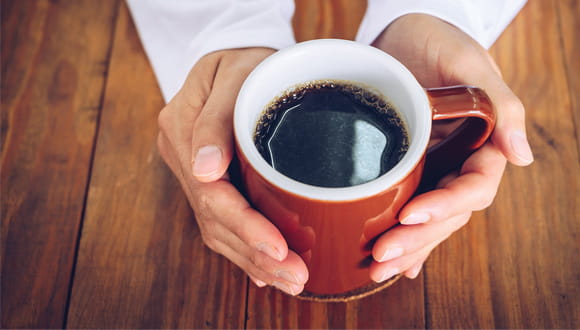Caffeine & Sleep: How Long Does Caffeine Keep You Awake?
July 7, 2023 - Katie McCallumInstead of counting sheep you're counting hours of sleep. Specifically, the number of hours you're not getting. Or, maybe you're counting the number of hours you might get if you fell asleep right now. Nope, still not asleep.
Was it that latte you had after lunch??
You know caffeine can keep you awake, and there are the obvious times to avoid it. (Right before bed, for instance...just in case...)
But is an afternoon pick-me-up really a problem? At the time, it felt like you needed it just as much as the sleep you're not getting now.
“It’s very important to be sure you’re getting quality sleep,” says Dr. Rashad Ramkissoon, a primary-care physician at Houston Methodist. “Certain afternoon and evening habits can get in the way of that, and caffeinated beverages are one prominent example.”
So, when it comes to that gray area between late morning and early evening, how late is too late to drink that coffee you so desperately need — or even just a soda or iced tea with dinner — without it affecting your sleep?
How does caffeine work?
Once consumed, caffeine is very quickly absorbed and distributed throughout your body, including to your brain. It's here that caffeine elicits its most classic effect — helping keep you alert and awake.
“Caffeine works by blocking sleep-promoting receptors in your brain called adenosine receptors,” says Dr. Ramkissoon. “It can do this because, structurally, caffeine looks very similar to adenosine, the molecule that usually binds to these receptors.”
Adenosine plays many roles, including helping to regulate your sleep/wake cycle. Its levels in your brain fluctuate — fairly low when you wake up and slowly building throughout the day. After several hours of being awake, adenosine levels increase to a point where they start the process of making you sleepy.
Unless its receptors are blocked by caffeine, that is. When this happens, the downstream sleep-promoting pathways aren’t activated, meaning you stay awake and alert in the meantime.
How long does caffeine last?
“Fortunately, caffeine doesn’t hang around in your body forever,” says Dr. Ramkissoon. “It is important to understand how long it can, though, since the timing could overlap with a planned bedtime and affect sleep quality if you’re not careful.”
According to the FDA, the half-life of caffeine — the time it takes for the starting amount of the substance to reduce by half — is between four and six hours.
This means that up to six hours after drinking a caffeinated beverage, half of the caffeine you consumed is still present in your body — keeping you alert. And, if it's bedtime, potentially keeping you from falling or staying asleep.
“Getting enough sleep is important for waking up feeling well-rested, but it's also critical for our overall health," adds Dr. Ramkissoon. "A lack of quality sleep over time is linked to a wide range of health issues, from high blood pressure to obesity — so it's important to take steps to ensure you're getting a good night's rest."
How late is too late to drink caffeine?
We know how it works. We know about how long it can last.
But what does all of this mean as far as when is too late to enjoy caffeine without it affecting your sleep? Unfortunately, it’s a question with somewhat of a murky answer.
“Caffeine tolerance can vary from person to person — some people are more sensitive to caffeine, others less sensitive,” says Dr. Ramkissoon. “And not everyone’s work schedules and bedtimes are the same.”
As a rule of thumb, though, the recommendation for someone who works a 9 to 5 and follows a standard evening bedtime is to cut off caffeine intake around 2 or 3 p.m.
“Research on the exact timing caffeine’s impact on sleep is limited, but there is one small study showing that having caffeine as early as six hours before bedtime can affect sleep, even if you don't notice the disruption,” says Dr. Ramkissoon. “When it comes to getting quality sleep, it’s better to be safe than sorry. So that’s a good timeline to work from no matter your usual bedtime.”
That said, the study’s participants were given the maximum daily dose of caffeine (which is 400 mg, by the way). This might not be a realistic representation of the average adult's afternoon consumption — though it may be a totally accurate representation of, say, a college student's.
Ultimately, there's probably no one-size-fits-all rule as to how late is too late when it comes to consuming caffeine.
The length of time your favorite caffeinated beverage might hang around in your system varies depending on:
- It's caffeine content
- How much caffeine you already had in your system
- How effective your body is at metabolizing caffeine
And while your favorite drink may not have 400 mg of caffeine in it like the participants in the study mentioned above, you may be surprised just how much caffeine is in some common beverages.








